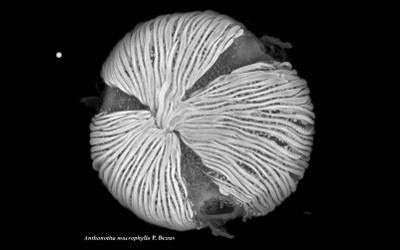Unlocking the secrets of pollen: OU’s role in a groundbreaking international digitisation project

In a transformative leap for the century-old science of palynology - the study of pollen - The Open University (OU) is helping in/contributing to a global effort to digitise and preserve one of the world’s most important botanical collections. Dr Luke Mander, a Senior Lecturer in Earth Sciences at the OU, is contributing his expertise to a pioneering project that is set to revolutionise how scientists study the microscopic grains that hold the key to understanding past ecosystems, plant evolution, and even crime scenes.
At the heart of the project is the digitisation of approximately 18,000 microscope slides of pollen grains from the Smithsonian Tropical Research Institute in Panama. These slides, which predominantly represent Neotropical plant species, are being scanned using a variety of advanced microscopy techniques to create high-resolution digital records. These digital images will form the foundation of a powerful new resource for global researchers.
The implications of this work are profound. Traditionally, palynologists have identified and classified pollen by peering through microscopes, manually comparing thousands of grains to reference specimens. This painstaking work is limited by time and human subjectivity. The new digitised images, however, are designed to feed into artificial intelligence environments - including neural networks - that can rapidly and accurately classify pollen at unprecedented scale and precision.
“The digitisation of this collection is more than a technical achievement - it’s a conceptual leap for the discipline,” said Dr Mander. “The digitized collection can be used as a training set that will allow artificial intelligence to unlock the full scientific potential of pollen, enabling faster, more reliable, and more comprehensive analyses than ever before.”
The project is led by Dr Carlos Jaramillo at the Smithsonian and brings together an extraordinary team of 38 collaborators from around the world, including microscopy specialists, computational scientists, AI developers, and palaeobotanists. One of these is Dr Surangi Punyasena who constructed the artificial intelligence environment for this project and works with Dr Mander on the recently funded Mind the Gap project on angiosperm evolution. Dr Mander’s contribution focuses on defining the scientific questions that this new digital dataset can help answer - ranging from reconstructing ancient rainforests to mapping plant evolution across deep time.
Beyond accelerating research, the project is addressing an urgent conservation need. Microscope slides—delicate and often decades old - deteriorate over time. Digitising them not only safeguards the data they contain but ensures that future generations of scientists can continue to benefit from these irreplaceable specimens.
The OU’s involvement in this global endeavour highlights its commitment to cutting-edge, interdisciplinary research with lasting societal impact. As Dr Mander explains, “This project offers a fresh start for palynology. We’re reimagining what’s possible in this field by merging traditional natural sciences with AI and digital preservation.”
Looking ahead, the team hopes to secure funding to digitise other major slide collections, including the 16,000-specimen archive held at the Royal Botanic Gardens, Kew. Expanding the dataset will enhance the robustness of AI-powered pollen analyses and further cement the role of digital science in preserving and unlocking natural history.
Through projects like this, The Open University is helping reshape scientific disciplines - and opening new windows onto the ancient past, one pollen grain at a time.
Contact our news team
For all out of hours enquiries, please telephone +44 (0)7901 515891
Contact detailsNews & articles
AI sheds new light on dinosaur footprints
A new publication introduces a transformative AI approach to studying dinosaur footprints, offering researchers (and enthusiasts!) an objective way to classify tracks and investigate the conditions in which dinosaurs lived.